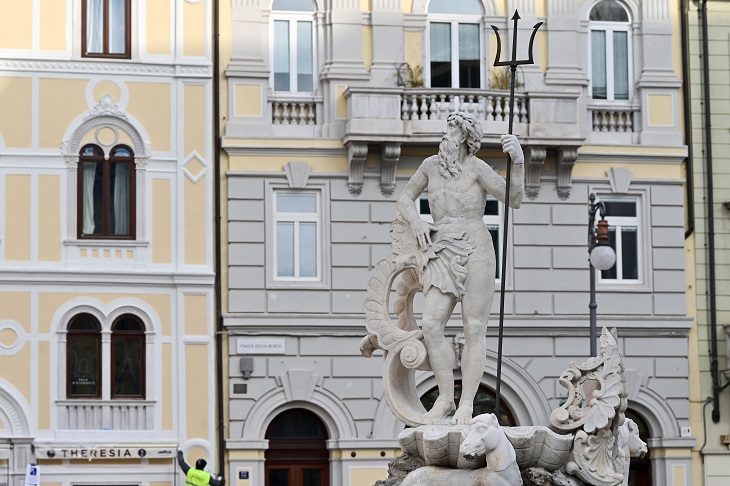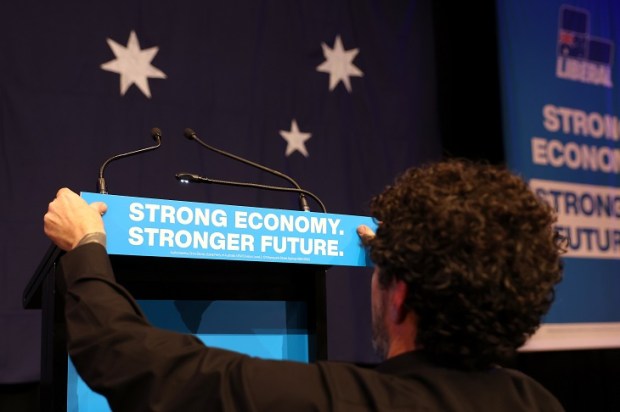The uneasy groan, stutter, and clunking of the modern age rises through the square in Italy’s coastal port of Trieste.
Tourist buses squeeze down streets better suited to Roman carts, while heavy-set cars lurch over the cobblestones, cutting their rubber fronts on the stone where they leave behind black stains and flecks of paint. Messy power lines tangle above, slouching in the gaps between the marble facades that bear the faces of mythical heroes and dead personalities. Traffic lights and the green neon crosses of the Farmacia leer out. ‘Useful but unpleasant’ I believe is how it was put by a friend attempting to crop them from a photograph.
I will remember Trieste as a pretty town waking up to the world even though it is one of Europe’s industrial ports. The rose-tinted perspective of a guest… Before 8am in the tourist areas the cafes are open but little else, leaving people to strut purposely to nowhere. It is a region run by twin tides, the water and a human swell of sightseers that arrive and depart at regular intervals, washing over the businesses. This is the lull. There is no point fighting against it and so, with nowhere in particular to be, I joined the wandering souls.
Trieste’s streets end abruptly in a main road where the traffic has one last crack at pedestrians. On the other side there is a narrow pathway, a drop, and then water with a scattering of lamp posts to mark the edge of the town. Giant cruise liners perch in the harbour beyond – eerily still and impervious to the gentle motion that tugs smaller boats against their moorings. The true port shimmers as a severe line in the distance shadowed by coloured cranes and industrial equipment.
Modernity’s incursion into this scene is uncouth – a melancholy disorder that mimics that chaotic state of Western life where tourists spend fortunes reminiscing in ancient cities only to partake in the age of ‘progress’ that has no clue where it is going. Later, the feeling will be revisited on the docks in Split, where the shops are pressed into the remains of Diocletian’s palace and its streets stretch out like the dried-out arteries of some long-dead creature.
Trieste has, this month, won a victory for its soul. It became Beijing’s latest embarrassment after Italy decided to abandon the widely publicised Belt and Road deal which would have left the port city as a security liability in the Western sphere. ‘For the Chinese, this is a major humiliation,’ said Yun Sun. ‘For Italy to publicly announce its intent to withdraw from the Belt and Road, I think for the Chinese they take great offence in that decision.’ Italy’s pandering to China in the early months of the Covid pandemic makes more sense when you realise there was a $2.8 billion investment deal on the table and a trade reach promise of $78 billion – but China has caused Italy too much pain, with the relationship becoming cautious under the watch of Prime Minister Meloni. China has since found its moves against Italian businesses thwarted and its existing projects pushed down the road and, in most cases, off a Mediterranean cliff.
Long before the decision, the late Silvio Berlusconi sent a letter saying that Italy could not ‘leave the most strategic of infrastructures, the port of Trieste, in the unfriendly hands of the Chinese Silk Road project.’
‘Naturally, China is an essential interlocutor for a territory that thrives on trade, but the relationship with China cannot be one of structural subordination. Trieste and its territory are for my generation the symbol of love for Italy. The tenacious will of the people of Trieste to reunite with the motherland in the post-war years, at the time of the British administration Zone A, but also the martyrdom of the Julian-Dalmatian populations forced into exile, the victims of sinkholes guilty only of being Italian, the laceration of Gorizia symbolized by Piazza della Transalpina divided in two by barbed wire, are events I have a vivid memory of from the years of my adolescence, the years in which I became passionate about politics supporting De Gasperi’s Christian Democracy. Seventy years later, much has changed, thanks to Europe and the collapse of communism.’
Italy was the first G7 country to sign up to the Belt and Road Initiative, now – as Europe and America distance themselves from the increasingly aggressive communist regime – they have thought better of it.
In 2019, when the agreement was first discussed, Italy felt isolated from Europe and its open-border policies which were causing problems for Italian towns to the ignorance of Brussels. China was knocking at the door, wooing Italian companies and government officials with deep pockets and impossible vistas.
Beijing’s dream to rebuild the Silk Road of legend demanded Italy as its vassal trading outpost and a wedge against the EU.
It is surreal to watch these modern conflicts play out while sitting comfortably in the shadow of the old world. The marks of Rome and Greece provide scaffolding for the stage – twin expired empires decaying in front of the constant flicker of Instagram photos. Trieste is a town full of men with grand dreams. Conquerors, rulers, artists, and explorers of the world and the mind. There are figures of great beauty, failed love, and adventurers of the sea. Family fortunes were poured into buildings created for permanence, standing as the antithesis of our impatient culture which values efficiency to the point it programs human beings out of the equation at every opportunity. Their marble will remain long after our modern concrete and glass monstrosities rot.
The answer to this problem of collapse is not to hand over construction to foreign powers. Stagnation is not a solution either, and so we ask the question, is our civilisation going to vanish in an instant – like Ubar, the Atlantis of Sands? Or shall the West be hacked at by raids and rebellion – petty wars and idiot leaders… Perhaps our world will be overtaken by ‘progress’ until its customs are watered down, dribbling into the gutters and harbour beyond while its people are slowly replaced by newcomers. Like a body shedding its cells, a city’s buildings may remain but its flesh – the living entities, change beyond recognition.
Sometimes better civilisations are created, but usually modern populations are found squatting in the shade of past grandeur. Parasites surviving off the achievements of ghosts.
Devotion to beauty and worship for the sake of permanence is not something a generation taught to ‘own nothing and be happy’ can comprehend. Those who revile inherited wealth as a capitalist evil cannot see the merit in the accumulation of cultural wealth that benefits those who are yet to be born.
Seduced by eternal rebellion, we’ve built nothing of worth. Created little of value. And failed to maintain pride in ourselves as a people. The idle hands of jealousy have started tearing town statues and burning books.
Sipping coffee in the square, shaded by red-cloth awnings with a glimpse of open water, it is evident that sometimes it is hard to grasp what has been lost until you find yourself a tourist in the ruins.
Alexandra Marshall is an independent writer. If you would like to support her work, shout her a coffee over at donor-box.
Got something to add? Join the discussion and comment below.
Get 10 issues for just $10
Subscribe to The Spectator Australia today for the next 10 magazine issues, plus full online access, for just $10.


























Comments
Don't miss out
Join the conversation with other Spectator Australia readers. Subscribe to leave a comment.
SUBSCRIBEAlready a subscriber? Log in